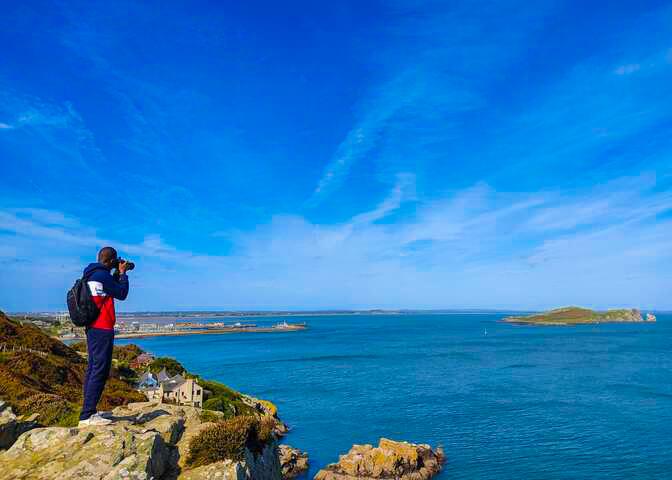Airton Hernany Lima Jesus
(Cabo Verde)
MSc in Geographic Information Science, Technological University Dublin

I wholeheartedly recommend that you apply for the Ireland Fellows Programme; as it is more than just a financial award. From the moment you are chosen, you receive a range of support. The Ireland Fellows Programme has proven to be an exceptional opportunity for my personal and academic development.
I am Airton Hernany Lima Jesus, from the Cape Verde Islands, a stunning archipelago situated in the heart of the Atlantic. Portuguese is our official language, while Creole is our native language. The country is home to approximately 500 thousand inhabitants. It was on the island of Santo Antão that my love for nature, coupled with my fervour for music and the exciting exploration of new places and cultures, blossomed. Prior to starting my academic pursuits in Ireland, I worked for five years in an environmental conservation organization in Cape Verde, with a primary focus on marine conservation. These years started a meaningful journey of learning and solid commitment to environmental causes.
Initially, I faced a decision studying either climate change or geographic information science. The former, a subject of paramount importance and urgency in our contemporary world; the latter, an emerging technological frontier with considerable potential. After careful consideration, I chose to pursue a master's degree in Geographic Information Science at Technological University Dublin (TUD). Choosing this course has provided me with the chance to learn about this potent tool that can be effectively utilized not only for the advancement of technological frontiers, but also to comprehend and mitigate the impacts of climate change. This is particularly crucial in regions such as Cape Verde, where expertise in this field remains relatively rare.
The Ireland Fellows Programme has proven to be an exceptional opportunity for my personal and academic development. Since my arrival in Ireland, each encounter with new friends, diverse cultures, and various experiences has been invaluable. My learning extends beyond academic pursuits, encompassing personal growth as I embrace values and knowledge that exceed the confines of the classroom.
The MSc in Geographic Information Science at Technological University Dublin has allowed me to tap into the world of programming and web design, fields previously unfamiliar to me. Within the context of one of the projects, I took the opportunity to integrate my passion for marine conservation with these newfound competencies, culminating in the development of a website aimed at promoting volunteer participation in safeguarding sea turtles. The website is accessible at the following link: Sea Turtle Conservation (love-turtle.netlify.app) [https://love-turtle.netlify.app/].
I have adapted to my new journey in Ireland quite well drawing on my prior four-month conservation training in another European country. While Ireland is known for its occasional rainfall, I sometimes find myself without an umbrella. The most notable adjustment has been to the climate. Having come from the sunny and warm Cape Verde, I have had to adapt to Ireland’s colder and more consistently rainy weather. In Cape Verde, rainfall is rare, typically happening only two to three times per year, mainly during the summer. Additionally, our region often experiences severe drought, heightening the value of rain. I have shared with my colleagues here that in Cape Verde, when rain does occur, it becomes a noteworthy event, with people capturing and sharing photos on social networks, even making it to the news. This has surprised them, as rain is a regular phenomenon in Ireland. Nevertheless, for us, rain holds immense significance, both socially and economically, due to its scarcity and importance in sustaining our region during droughts.
My main goal during my fellowship is to acquire understanding of various subjects with the intention of returning to Cape Verde equipped not only with valuable knowledge, but also possessing the capacity to publicise and apply to make a positive impact within my homeland.
Upon my initial arrival at the airport, the immigration officer seemed to be surprised with my passport. Initially concerned about a potential issue with my document, my worry disappeared when he smiled and shared it with his colleague as it was his first time encountering a Cape Verde passport. Then he extended a warm welcome and expressed best wishes for my studies, creating a positive and welcoming first impression. Thus far, the most heart-warming aspect of my experience has been the opportunity to engage socially with other Ireland Fellows from diverse countries. Establishing new friendships, exploring various cultures, and receiving invitations to visit their respective nations have proven to be an immensely enriching experience.
I wholeheartedly recommend that you apply for the Ireland Fellows Programme; as it is more than just a financial award. From the moment you are chosen, you receive a range of support. The assistance starts with the visa application process, continues with comprehensive pre-departure information and does not end when you arrive in Ireland. The Ireland Fellows Programme is overseen by ICOS, an NGO with a longstanding role in managing the programme on behalf of the Department of Foreign Affairs. ICOS support is multi-faceted, covering academic needs, physical well-being, and mental health. But it doesn't end there. They go to great lengths to ensure that you acquire other skills that will help you integrate into the community. This includes offering a variety of complementary training sessions that you can take part in, as well as volunteering opportunities in Ireland. This not only allows you to immerse yourself in Irish culture, and meet new people, but also to make a meaningful contribution to the community.
My advice to people whose native language is not English would be trying to familiarise themselves with expressions and vocabulary through translating song lyrics or watching films with English subtitle. I used to have people correct my English, which helped me to learn and gain more confidence as English is not my mother tongue. Believe in yourself!